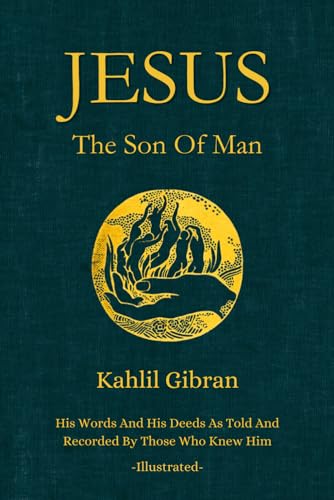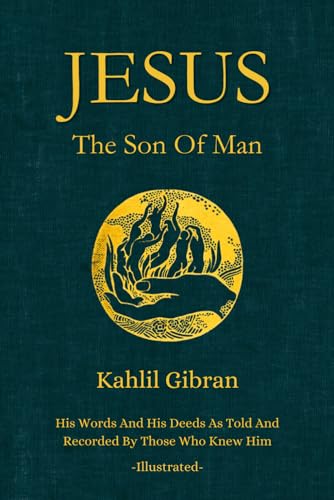“The Life of Jesus: His Words and Deeds Through the Memories of His Closest Companions (Illustrated by the Author)”
Jesus the Son of Man is a central figure in Christianity, believed to be the incarnation of God on Earth. Known for his teachings of love, compassion, and forgiveness, Jesus is revered by Christians as the savior of humanity. His life and ministry, as described in the New Testament of the Bible, have had a profound impact on the world for over two thousand years. In this introduction, we will explore the life, teachings, and legacy of Jesus the Son of Man.


Jesus the Son of Man Plot Summary
“Jesus the Son of Man” is a novel written by Kahlil Gibran, a Lebanese-American writer and poet. The story follows the life of Jesus Christ, focusing on his humanity and the struggles he faced as he fulfills his divine mission on Earth. The novel explores themes of love, compassion, sacrifice, and the inherent goodness of humanity.
The story begins with the birth of Jesus in Bethlehem, as the son of Mary and Joseph. From a young age, it is clear that Jesus is different from other children. He possesses a wisdom and compassion that is beyond his years, and he is drawn to helping those in need. As he grows, Jesus learns of his divine purpose – to bring salvation and redemption to the world.
Throughout the novel, Jesus encounters many different people from all walks of life. He heals the sick, feeds the hungry, and preaches a message of love and forgiveness. Despite facing opposition from religious authorities and political leaders, Jesus remains steadfast in his mission, always guided by his unwavering faith in God.
One of the central themes of the novel is Jesus’ humanity. Despite his divine nature, Jesus experiences the full range of human emotions – joy, sorrow, anger, and doubt. He wrestles with doubt and fear as he faces the enormity of his mission, and he struggles with the limitations of his own humanity. Through it all, Jesus remains a beacon of light and hope, inspiring those around him to live lives of love and compassion.
The novel also explores the relationships Jesus forms with his disciples and followers. He surrounds himself with a diverse group of individuals, including fishermen, tax collectors, and outcasts. Through his interactions with them, Jesus teaches the importance of forgiveness, love, and unity. His disciples are often flawed and imperfect, yet Jesus sees their potential for greatness and forgives them their shortcomings.
As Jesus’ ministry grows, he becomes a threat to the religious and political authorities of his time. They see him as a radical and dangerous figure, challenging their power and authority. Despite the mounting opposition, Jesus remains resolute in his mission, knowing that his ultimate destiny is to sacrifice himself for the salvation of humanity.
The climax of the novel comes with Jesus’ betrayal, trial, and crucifixion. Even in the face of immense suffering, Jesus remains true to his message of love and forgiveness. As he hangs on the cross, he asks God to forgive his enemies, embodying the ultimate act of compassion and sacrifice. Through his death and resurrection, Jesus fulfills his divine mission, offering salvation and redemption to all who believe in him.
In the end, “Jesus the Son of Man” is a powerful and moving portrayal of the life and teachings of Jesus Christ. Through the eyes of Kahlil Gibran, we see a vision of Jesus that is both human and divine – a figure of boundless love and compassion, who inspires us to live lives of kindness and generosity. The novel challenges us to reflect on our own beliefs and values, and to consider the true meaning of faith and spirituality in our lives.
Overall, “Jesus the Son of Man” is a timeless and enduring work that continues to resonate with readers around the world. Its message of love, forgiveness, and redemption is as relevant today as it was when it was first written. Through the story of Jesus Christ, Kahlil Gibran invites us to embrace our own humanity and strive for a better, more compassionate world.
Jesus the Son of Man Key Takeaway
One key takeaway from the book “Jesus the Son of Man” by Khalil Gibran is the idea of Jesus as a timeless and universal figure who transcends religious boundaries and conventions. Gibran presents Jesus as a prophet and a revolutionary, challenging the existing power structures and societal norms in order to bring about spiritual awakening and renewal.
Throughout the book, Jesus is portrayed as a compassionate and understanding teacher who seeks to guide people towards a deeper understanding of themselves and their relationship with the divine. He speaks of love, forgiveness, and the importance of inner transformation, emphasizing the values of humility, compassion, and selflessness.
Another key takeaway from the book is the idea that true spirituality is not bound by rigid dogma or external rituals, but is a personal and inward journey of self-discovery and awakening. Jesus challenges his followers to look beyond the superficial and material aspects of religion, and instead focus on cultivating a deep and authentic connection with the divine.
Overall, “Jesus the Son of Man” offers a fresh and insightful perspective on the figure of Jesus and his teachings, inviting readers to reconsider their own beliefs and approach to spirituality. The book encourages a more personal and intimate relationship with the divine, emphasizing the universal values of love, compassion, and understanding that lie at the heart of Jesus’ message.
Conclusion
In conclusion, “Jesus the Son of Man” explores the human side of Christ and delves into his emotions, struggles, and experiences during his time on Earth. Through vivid storytelling and deep insights, the author brings Jesus to life in a new and relatable way, making him more accessible and understandable to modern readers.
This book is a must-read for anyone interested in understanding the historical and cultural context of Jesus’ life, as well as those seeking a fresh perspective on his teachings and mission. The author’s ability to blend historical facts with creative storytelling creates a compelling narrative that will captivate readers from start to finish.
Overall, “Jesus the Son of Man” is a thought-provoking and engaging book that offers a unique interpretation of one of the most influential figures in human history. Readers who enjoy historical fiction, religious studies, or simply a good story will find this book to be a rewarding and enlightening read.
I recommend this book to anyone looking to deepen their understanding of Jesus and his message, as well as to those who enjoy exploring the complexities of faith and spirituality. “Jesus the Son of Man” will challenge readers to reconsider their preconceptions about Jesus and to see him in a new light, as a truly human and relatable figure who continues to inspire and guide us today.

No responses yet